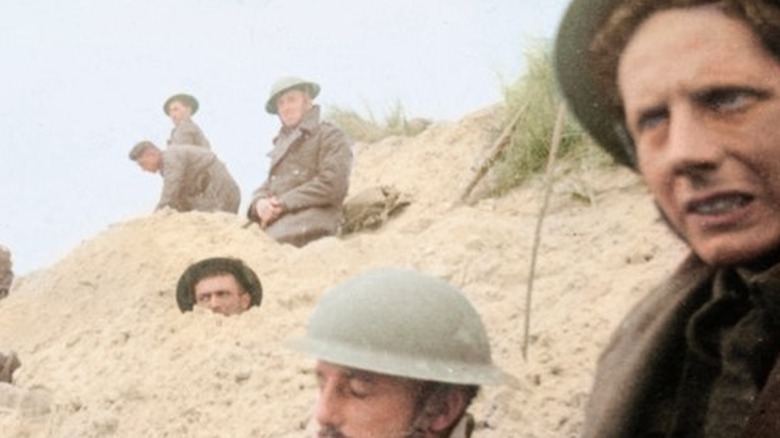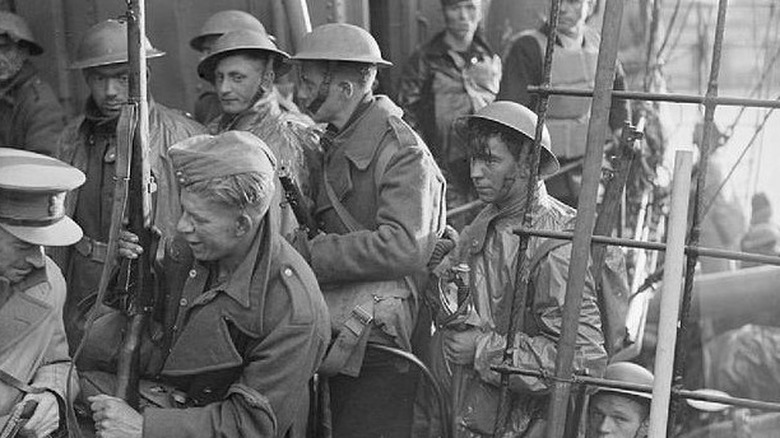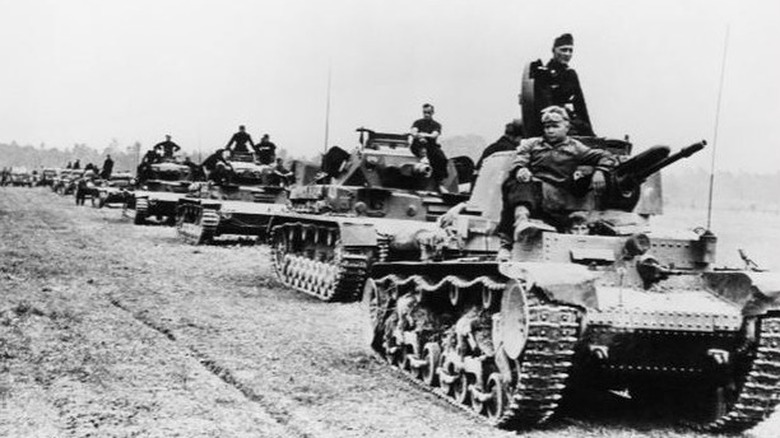The Critical Mistake Hitler Made In The Battle Of Dunkirk
In late May and early June 1940, British and French forces were encircled by the German army in the small French port town of Dunkirk, located on the English Channel near the French-Belgian border. Outmatched by the German Luftwaffe, what was left of the British Expeditionary Force (pictured above), along with troops from the French resistance, had their backs pinned to the water. In that position, they faced an epic defeat at the hands of Nazi Germany, which, under the command of Adolf Hitler, had only just pushed into France, and signed an armistice with the Third French Republic.
Hitler, whose Wehrmacht overwhelmed France in just six weeks, accomplished what the German Kaiser during World War I could only have dreamed of. What seemed like certain victory for Germany in the Battle of Dunkirk, though, turned instead into a point of pride for the Nazi resistance, fighting together per the Anglo-French agreement, known as the Entente Cordiale. Just when unchallenged German success at the port town of Dunkirk seemed imminent, in an effort called "Operation Dynamo," more than a quarter-million British and French forces were rescued in a mix of private British vessels and the Royal Navy.
The success of the Dunkirk rescue mission is now immortalized by the phrase "Dunkirk spirit." The tables turned for the Nazis at Dunkirk because of just one of many tactical mistakes Hitler made during wartime. All combined, those strategic blunders, beginning on the beaches of Dunkirk, helped the Allies defeat Nazi Germany five years later (via Newsweek).
Resistance forces were no match for German panzers
German forces had the upper hand at Dunkirk with superior air power from the German Luftwaffe and Nazi panzer divisions (tanks). Early on in the war, these forces, along with Nazi ground troops combined in Nazi Blitzkrieg, translated from German to "lightning war." Allied field commanders had seen nothing like it, and at Dunkirk, in 1940, it seemed like the principles of Blitzkrieg would spell certain Nazi victory.
Then, as fast as Germany had stormed into France, quelling all resistance, and pushing what remained northward to Dunkirk, Hitler approved the decision to hold his panzer division for 36 hours before striking, giving Britain valuable to regroup and evacuate (per History). With victory within his grasp, why did Der Führer suddenly show such restraint? If he kept up the pressure, the course of World War II might have changed.
Answers to what Hitler was thinking at Dunkirk have varied. According to Newsweek, at that time, the Nazi leader told his generals: "[I]t's always good to let a broken army return home to show the civilian population what a beating they've had," which might possibly explain Hitler's strategy. As The Daily Beast notes, after one British general was back on U.K. soil, he commented: "I still cannot understand how it is that the [Germans] have allowed us to get the [British Expeditionary Force] off in this way. It is almost fantastic that we have been able to do it in the face of all the bombing and gunning."
A number of issues likely influenced Hitler's decision
Though Hitler was the commander of all German forces, there were likely a number of reasons German Panzer divisions failed to deliver their death blow at such a crucial moment, the first of Hitler's many tactical errors during the war. Though the Nazis were on the offensive in France at that point, there had been stiff resistance — more so than expected, especially around the French town of Arras. Some historians point toward both Hitler and the German commanding general's decision to divert German tanks from Dunkirk to beat back allied forces at Arras before the 36-hour panzer halt order was announced
Another possible motivation could have been because German ground troops had reportedly fallen behind their panzer divisions as they rolled across the countryside. A break was ordered to simply allow them time to catch up. Luftwaffe commander Hermann Wilhelm Göring may have also wanted to prove to Hitler his Luftwaffe aircraft were up for the task of finishing off Dunkirk troops without panzer help, as Business Insider reports. Göring's planes flew to Paris, instead.
It was also Field Marshal Gerd von Rundstedt of the 7th Panzer Division, not Hitler, that at first ordered the panzers to stop for 36 hours, though Hitler did later approve it. Bolstered by the Dunkirk evacuation, Churchill gave his now immortal speech, "We shall fight on the beaches," which set the tone for the rest of the conflict and the eventual Allied victory five years after the last British soldier was rescued from Dunkirk's beaches (via the International Churchill Society).


